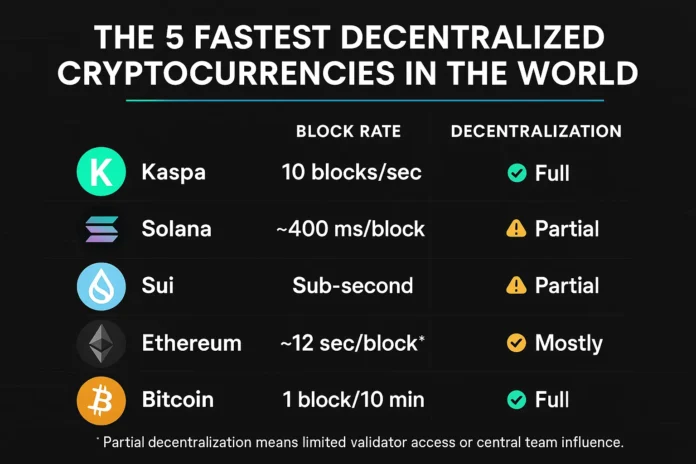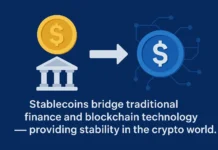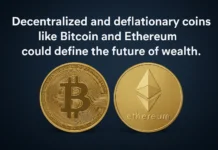
Speed and decentralization are often at odds in the blockchain space. Many networks achieve high throughput by reducing the number of nodes or increasing hardware requirements, which can lead to centralization. On the other hand, highly decentralized systems can struggle to match the speed needed for mass adoption.
Only a few projects have managed to achieve the perfect balance — offering lightning-fast transactions while preserving both security and decentralization. Here’s our list of the five fastest decentralized cryptocurrencies in the world, ranked by their ability to process transactions without compromising trustlessness.
Decentralization Ratings
| Cryptocurrency | Decentralization Level |
|---|---|
| Kaspa (KAS) | Full |
| Solana (SOL) | Partial |
| Sui (SUI) | Partial |
| Ethereum (ETH) | Mostly |
| Bitcoin (BTC) | Full |
Kaspa (KAS) — Fully Decentralized
• Consensus: Proof-of-Work, BlockDAG via GhostDAG protocol
• Block Rate: 10 blocks per second (~600 blocks per minute)
• Why It’s fast: Kaspa’s BlockDAG architecture allows multiple blocks to be created and confirmed in parallel, unlike traditional blockchains that add one block at a time.
• Decentralization Strength: Thousands of nodes worldwide, open GPU mining, no central authority — making Kaspa one of the most decentralized blockchains in existence.Solana (SOL) — Partially Decentralized
• Consensus: Proof-of-History + Proof-of-Stake
• Block Rate: ~400 ms block time (~2,500 transactions per second under optimal conditions)
• Why It’s fast: Solana’s unique Proof-of-History timestamps events before consensus, reducing communication overhead between validators.
• Decentralization note: With over 2,000 validators, very high hardware requirements mean that only well-funded operators can participate, which limits complete decentralization.Sui (SUI) — Partially Decentralized
• Consensus: Delegated Proof-of-Stake (Narwhal & Bullshark protocols)
• Block Rate: Sub-second finality for many transactions
• Why It’s fast: Sui separates transaction ordering from data dissemination, enabling parallel execution of many transactions at once.
• Decentralization Note: Early-stage network with only a few dozen validators. Validator participation is permissioned, and Mysten Labs still holds significant influence.Ethereum (ETH) — Mostly Decentralized
• Consensus: Proof-of-Stake
• Block Rate: ~12 seconds per block, but Layer 2 rollups boost throughput significantly
• Why It’s fast: While Ethereum’s base layer is slower than others here, Layer 2 solutions (Optimism, Arbitrum, zkSync) allow near-instant, low-cost transactions without giving up Ethereum’s security guarantees.
• Decentralization Note: Over a million validators (many through staking pools). Although governance and participation remain open to all, large staking providers such as Lido and Coinbase control a significant portion of staked ETH.Bitcoin (BTC) — Fully Decentralized
• Consensus: Proof-of-Work
• Block Rate: 1 block every ~10 minutes
• Why It’s Here: Bitcoin isn’t “fast” in block time, but it’s the most secure and decentralized cryptocurrency. With the Lightning Network, BTC can handle instant transactions without changing the base chain.
• Decentralization Strength: Largest, most geographically diverse node and miner network in the world, with no single entity able to control it.
Final Thoughts
In cryptocurrency, speed is meaningless without decentralization — without it, a network can be restricted, controlled, or even shut down. Kaspa stands out as the fastest truly decentralized Proof-of-Work blockchain, while Solana and Sui deliver high performance but with partial decentralization due to smaller or more exclusive validator sets. Ethereum and Bitcoin show that genuine trust in blockchain comes from decentralization, even when speed takes a back seat.
Frequently Asked Questions (FAQs)
What does “decentralized” mean in cryptocurrency?
Decentralization means no single entity or small group controls the network, allowing anyone to participate in validation, governance, and transaction processing without permission.
Is Kaspa the fastest decentralized cryptocurrency?
Yes. Kaspa achieves 10 blocks per second using its BlockDAG protocol while remaining fully decentralized through open GPU mining and an immense, distributed node network.
Why are Solana and Sui considered only partially decentralized?
Both have smaller or more exclusive validator sets, high entry barriers, and strong influence from their core teams, which reduces full permissionless participation.
How is “block rate” different from “transactions per second” (TPS)?
Block rate measures the number of blocks a network produces per second, while TPS tracks the individual transactions confirmed. A high block rate can boost TPS, but the two are not the same metric.
Can a cryptocurrency be fast without losing decentralization?
Yes — but it’s rare. Kaspa demonstrates that a blockchain can deliver high speed without compromising absolute decentralization.
Why is Bitcoin included if it’s slow?
Bitcoin’s base chain processes transactions slowly, but it remains unmatched in decentralization and security. Paired with the Lightning Network, it can handle transactions instantly.
Is Ethereum fully decentralized?
Ethereum is predominantly decentralized, yet substantial control by large staking pools over staked ETH marginally reduces its decentralization compared to Bitcoin or Kaspa.
Does GPU mining guarantee decentralization?
No, but it helps when mining is open and competitive, allowing anyone with hardware to participate without permission.
Will Sui and Solana become more decentralized over time?
Possibly. Both projects aim to broaden validator participation and reduce central control, but actual progress depends on governance decisions and user adoption.
Which is better — speed or decentralization?
It depends on the use case. Speed is significant for scaling and user experience, but decentralization ensures security, censorship resistance, and long-term trust.
- Dusting Token Scams — How They Work & How to Stay Safe
- Top 10 Deflationary & Decentralized Coins to Make You Rich in 5–10 Years
- Kaspa’s 10 Blocks Per Second: The Fastest Proof-of-Work Blockchain in History














